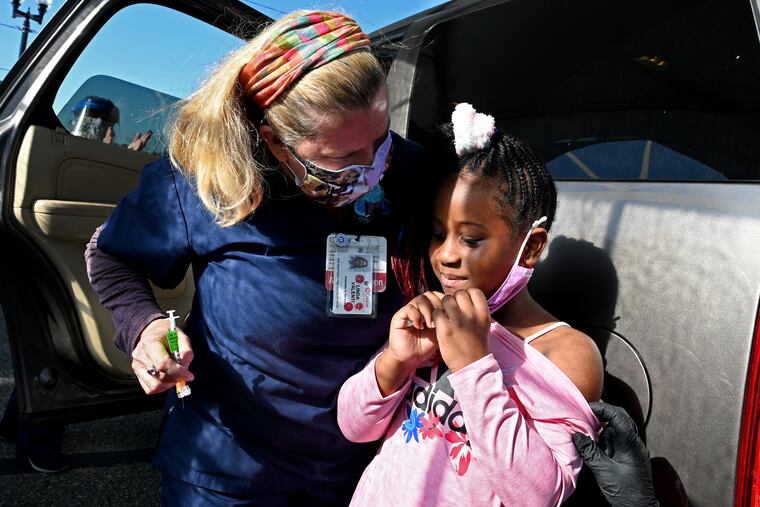Fewer than 5% of kids aged 5-11 in Philly have gotten their first COVID shot. That’s not nearly enough. | Opinion
As a pediatrician and father of two children with underlying conditions, I get frustrated when people say COVID-19 doesn’t affect kids. It does.

“No, Daddy! It hurts! Please don’t make me do it again!”
My 8-year-old daughter screamed as I held her still, the nurse cautiously approaching with a nasal swab. It was my daughter’s fourth COVID-19 test in the last year, and she knew all too well the burning and choking sensation of that swab.
As a pediatrician and father of two young children, I get frustrated when I hear people erroneously say that COVID-19 doesn’t really affect kids, and they don’t need to be vaccinated.
Although most of the more than 750,000 U.S. deaths from COVID-19 have occurred in adults ages 65 and older, young children account for an increasing number of cases and hospitalizations. And more than 900 children have died. While this number represents 0.1% of the total COVID-19-related deaths in the U.S., this fact is of little consolation to their families. Each child lost to COVID-19 had a full life ahead of them and died unnecessarily.
Similar to adults, children with underlying medical conditions are at increased risk of severe illness and death when compared with children without an underlying medical condition. This fact becomes an additional worry for the child and their caretakers as they manage the child’s health condition. My daughter has Type 1 diabetes. Even pre-pandemic, the slightest cold or stomach bug would have her mother and me testing her for ketones, administering extra insulin, and encouraging fluids in an effort to keep her out of the hospital. The specter of COVID-19 has added weight to her every sniffle, sneeze, and cough, contributing to more frequent doctor visits and time spent out of school at home to keep her safe.
» READ MORE: COVID cases are rising again in Philly, and only 5% of kids are vaccinated
Beyond the physical threat of COVID-19, the pandemic has had a larger impact on children’s development, academic achievement, social-emotional skills, and mental health. My son was diagnosed with autism at age 2. Recognizing the importance of early intervention, his mother and I worked hard to ensure he had all the support he needed to build strong social skills, despite his diagnosis. Our goal was to make sure he was ready for kindergarten, as children with significant developmental delay at the start of kindergarten struggle to catch up to their peers, falling further behind with each subsequent year.
The pandemic threw a monkey wrench into our plan to have him start kindergarten this year. We experienced disruptions in his services due to social distancing and quarantine requirements. His mother and I watched with increasing concern as his social skills regressed, and even considered holding him back a year just to regain all the skills he’d lost. So many of the families I see in clinic have had similar experiences, cobbling together piecemeal services and support to make up for pandemic-related disruptions in city programs.
COVID-19 has also strained school resources. While districts have successfully transitioned students back to in-person instruction, the impact of virtual learning has been felt, particularly for students of color who have fallen significantly behind their peers in reading and math skills. The effects of COVID-19 on the learning and development of children of color could persist for decades to come.
“The effects of COVID-19 on the learning and development of children of color could persist for decades to come.”
The best way out of this is by vaccinating as many children as possible. Fewer than 5% of kids aged 5-11 in Philly have gotten their first shot, and that’s not nearly enough. My daughter and son were among the first young children in our area to receive the COVID-19 vaccine.
As I discuss the importance of COVID-19 vaccination with my patients and their families, some raise concerns regarding mistrust of governmental systems and medical establishments. We talk about Henrietta Lacks and the Tuskegee experiment, commiserating over our experiences of racial inequity. While I acknowledge and empathize with the concerns of my patients and their families, the science remains clear. The Pfizer COVID-19 vaccine was tested in thousands of children and worked well with few side effects.
Children remain the unseen and unheard victims of this pandemic. Left unvaccinated, they could keep infecting people at home and at school, potentially extending the current pandemic.
Vaccinating our children will get us closer to ending this pandemic and getting our kids back to a normal childhood, lessening the already significant toll the pandemic has taken on their lifelong health and well-being.
Roy Wade Jr. is a pediatrician at Children’s Hospital of Philadelphia and an assistant professor at the University of Pennsylvania.